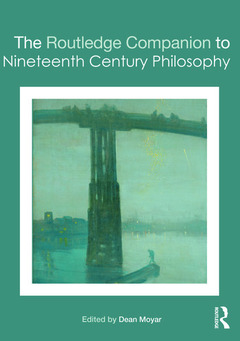The Routledge Companion to Nineteenth Century Philosophy Routledge Philosophy Companions Series
Coordonnateur : Moyar Dean

The nineteenth century is a period of stunning philosophical originality, characterised by radical engagement with the emerging human sciences. Often overshadowed by twentieth century philosophy which sought to reject some of its central tenets, the philosophers of the nineteenth century have re-emerged as profoundly important figures.
The Routledge Companion to Nineteenth Century Philosophy
- German Idealism
- philosophy as political action, including young Hegelians, Marx and Tocqueville
- philosophy and subjectivity, including Schopenhauer, Kierkegaard and Nietzsche
- scientific naturalism, including Darwinism, philosophy of race, experimental psychology and Neo-Kantianism
- utilitarianism and British Idealism
- American Idealism and Pragmatism
- new directions in Mind and Logic, including Brentano, Frege and Husserl.
The Routledge Companion to Nineteenth Century Philosophy
IntroductionDean MoyarPart 1: German Idealism 1. Self-Consciousness, System, Dialectic Scott Jenkins 2.Epistemology in German Idealism Dietmar Heidemann 3. The Philosophy of Nature of Kant Schelling and Hegel Dieter Wandschneider 4. The Moral Theory of German Idealism Allen Wood 5. The Political Theory of Kant, Fichte and Hegel Dean Moyar 6. The Aesthetics of Schelling and Hegel Rachel Zuckert Part 2: Philosophy as Political Action 7. After Hegel: The Actualization of Philosophy in Practice Michael Quante 8. Karl Marx Tony Smith 9. Tocqueville, Social Science, and Democracy Jon Elster Part 3: Rethinking the Subject 10. Early German Romanticism: the Challenge of Philosophizing Jane Kneller 11. Schopenhauer David Wellbery 12. Kierkegaard and German Idealism Merold Westphal 13. Nietzsche Ken Gemes and Chris Sykes 14. Bergson Keith Ansell-Pearson Part 4: Engaging Naturalism 15. Comte’s Positivist Dream, Our Post-Positivist Burden Robert Scharff 16. Darwin’s Philosophical Impact Richard Richards 17. The Philosophy of Race in the Nineteenth Century Robert Bernasconi 18. Psychology and Philosophy Gary Hatfield 19. Dilthey and the Neo-Kantians: The Dispute Over the Status of the Human and Cultural Sciences Rudolph Makkreel and Sebastian Luft Part 5: Utilitarianism and British Idealism 20. Mill: Logic and Metaphysics Fred Wilson 21. Mill’s Consequentialism Phillip Kitcher 22. British Idealism: Theoretical Philosophy Stewart Candlish 23. The British Idealists: Practical Philosophy and Social Responsibility David BoucherPart 6: American Pragmatism and Idealism 24. C.S. Peirce Vincent Colapietro 25. William James Robert Burch 26. Josiah Royce David SchweikardPart 7: New Directions in Philosophy ofMind and Logic 27. Post-Kantian Logical Radicalism Stephan Käufer 28. Franz Brentano Peter Simons 29. Gottlob Frege Kevin Klement 30. Edmund Husserl Christian Beyer
Dean Moyar is Associate Professor in the Department of Philosophy at Johns Hopkins University. He is the co-editor (with Michael Quante) of Hegel’s Phenomenology of Spirit: A Critical Guide (2007), and the author of the Hegel’s Conscience (2010).
Date de parution : 10-2012
17.4x24.6 cm
Date de parution : 03-2010
17.4x24.6 cm
Mots-clés :
Young Man; transcendental; Vice Versa; intellectual; Good Life; intuition; Younger Mill; idealism; Kant’s Critical Project; marburg; Natural Beauty; school; Nietzsche’s Central Concerns; logic; Free Agents; pure; Husserl 2001a; thought; Transcendent Ideal Forms; encyclopedia; Royce’s Idealism; Kant’s Transcendental Logic; Civil Society; Transcendental Logic; Hegel 1977b; Fichte’s Theory; Brentano’s Views; Boy Wizards; Early German Romanticism; Frege’s System; Logical Radicalism; Popular Science Monthly; Popular Science; Intentional In-existence; Alfred Kastil



